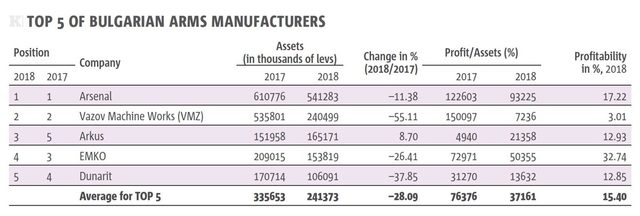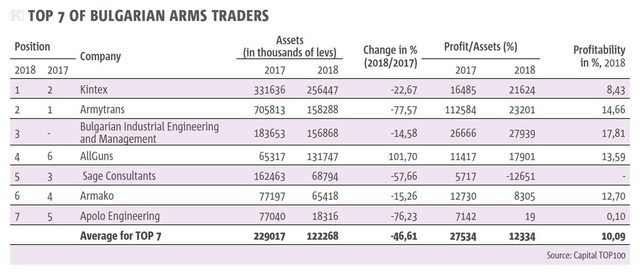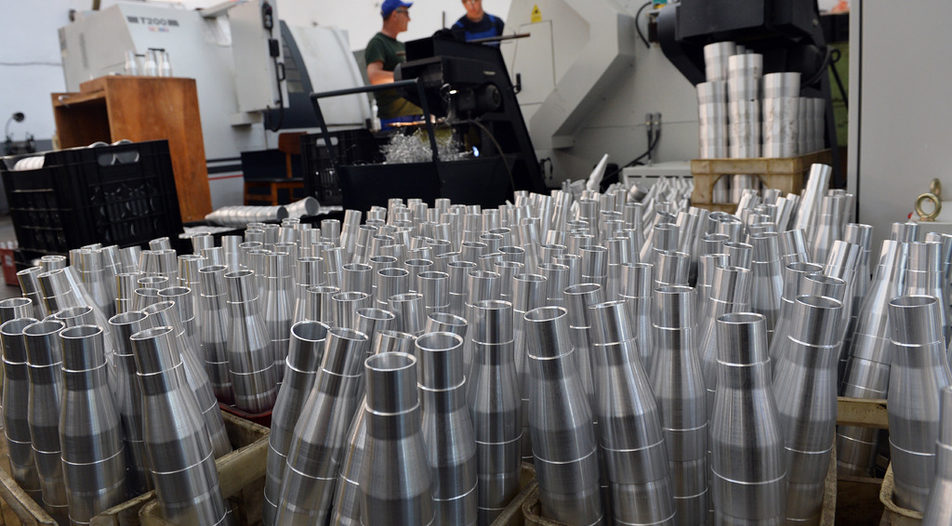At a moment when global armed conflicts are increasing it seems rather illogical for the Bulgarian armaments industry to report a slowdown. The top five manufacturers saw their 2018 revenue drop by almost 30% year-on-year, while arms traders lost nearly half of their sales.
For a sector that is one of the largest employers in Kazanlak, Veliko Tarnovo, Sopot and Ruse, and additionally supports hundreds of small businesses, the weaker season is bound to be a source of angst. However, data from the annual financial reports show that the industry is resilient. As a whole, the sector remains profitable and able to allocate investment for further automation of production lines and facility upgrades. But there is one disturbing fact: several companies admit that they are plagued by quality problems that lead to indemnity payments to clients and obstruct potential new lucrative contracts. In the wake of 2017 records
Downturns were reported by both state-run and private companies, revealing a general tendency for the Bulgarian arms industry in 2018. The largest manufacturer, Arsenal Kazanlak, which employs nearly 10,000 people, reported a drop in revenue of 70 million levs. Yet, revenue remained above the half-billion mark at 541 million levs and while profit also decreased (by almost 30 million levs), it stood at an impressive 93 million levs. Sopot-based state-owned VMZ recorded the sharpest drop in revenue, by 55% to 240 million levs, and a slump in profit from 150 million levs in 2017 to barely 7.2 million levs in 2018.
Arcus was the only arms manufacturer to improve its bottom line, increasing its profit from about 5 million levs in 2017 to more than 21 million levs. Emko and Dunarit, controlled by Emilian Gebrev, also reported considerably lower sales but Emko still remained the most profitable arms manufacturer. Arms traders also saw their revenue dwindle and one of the largest, Sage Consultants, swung to a loss of 12.6 million levs after its revenue fell by more than half. State-owned Kintex was number one in terms of revenue with sales of 256 million levs in 2018, which is 22% lower than the year prior. Armytrans, which led the 2017 ranking, dropped to the second position after a substantial revenue plunge to 158 million levs from 705 million. The only company to grow sales was All Guns. Bulgarian Industrial Engineering and Management company owned by Peter Mandzhukov was the most profitable arms trader. The problems facing the sector
In March 2019, deputy prosecutor general Ivan Geshev announced to the media that the authorities were investigating the delivery of substandard military hardware to India, which had led to the payment of millions of levs in indemnities to three international clients. People in the industry openly discuss the infamous gaffe from a few years back, when a shipment from the state-run VMZ generated massive recalls. As a consequence, the Indian government considered blacklisting Bulgarian offers, but was finally convinced the problem was with this particular manufacturer. Another challenge is that the full manufacturing capacity of the Bulgarian arms plants is occupied by a limited number of products, rarely of very complex nature. To assemble the whole package, say a howitzer battery, traders are forced to mix different supplies - the artillery shells and sound detection systems from Bulgaria, the howitzers themselves from another country, trailers and artillery tractors from a third country. At the same time, traditional suppliers refuse to complete orders, claiming a work overload. This makes companies turn to new logistical and delivery solutions, which may carry less advantageous price and payment conditions and might have quality problems. Ensuring proper financing continues to be a challenge for companies in the sector. Failure to obtain economically advantageous credits and guarantees creates difficulties since bank guarantees are necessary to participate in tenders. Without these, companies must involve their own resources and that hampers their liquidity. Because of the restrictions that international creditors face when it comes to lending to the arms sector, the main source of support comes from smaller Bulgarian-owned banks. Their help, however, comes at a steeper price: interest of about 6%, in spite of the fact that this is an export-oriented sector.


At a moment when global armed conflicts are increasing it seems rather illogical for the Bulgarian armaments industry to report a slowdown. The top five manufacturers saw their 2018 revenue drop by almost 30% year-on-year, while arms traders lost nearly half of their sales.
For a sector that is one of the largest employers in Kazanlak, Veliko Tarnovo, Sopot and Ruse, and additionally supports hundreds of small businesses, the weaker season is bound to be a source of angst. However, data from the annual financial reports show that the industry is resilient. As a whole, the sector remains profitable and able to allocate investment for further automation of production lines and facility upgrades. But there is one disturbing fact: several companies admit that they are plagued by quality problems that lead to indemnity payments to clients and obstruct potential new lucrative contracts. In the wake of 2017 records












